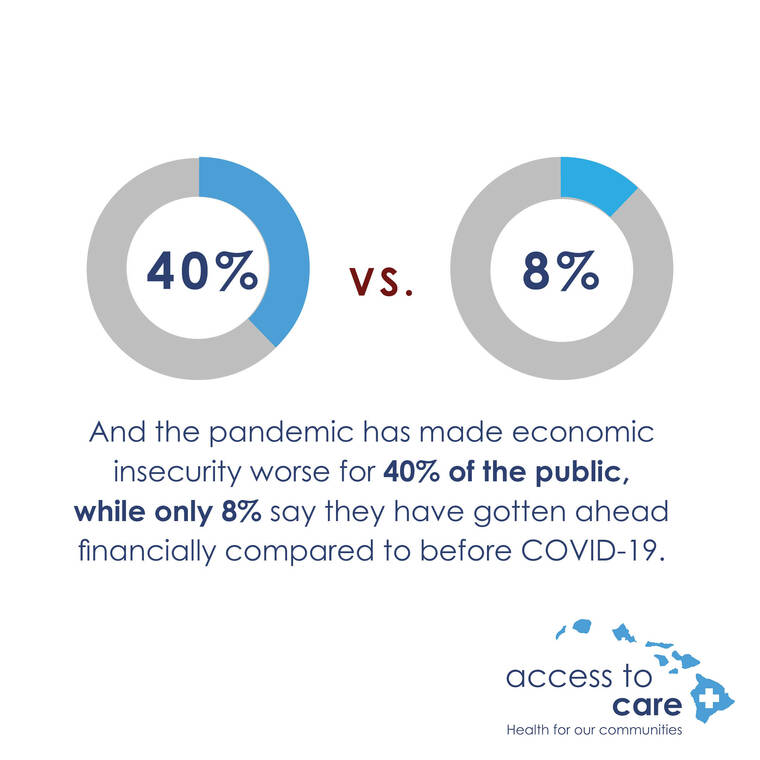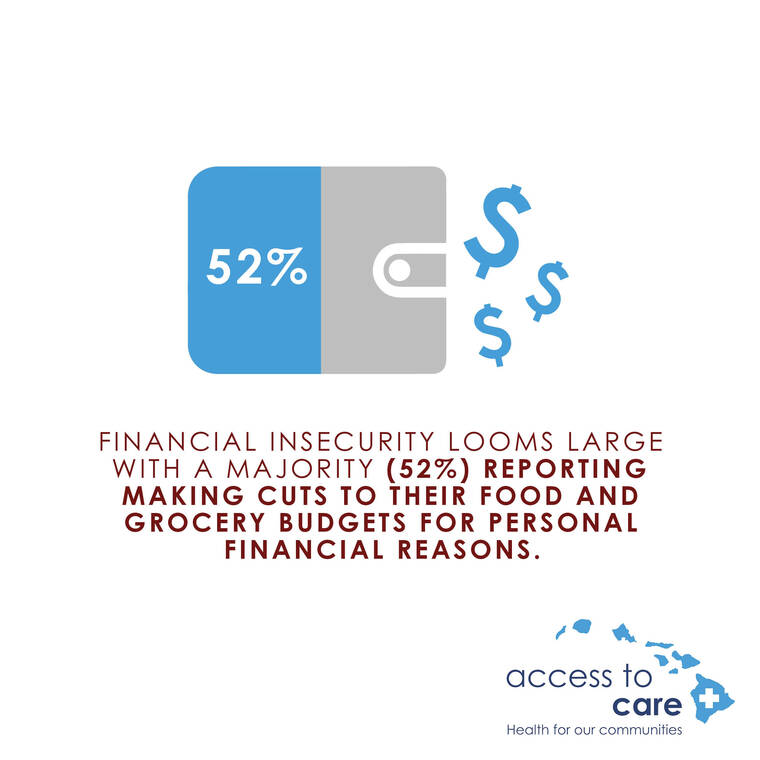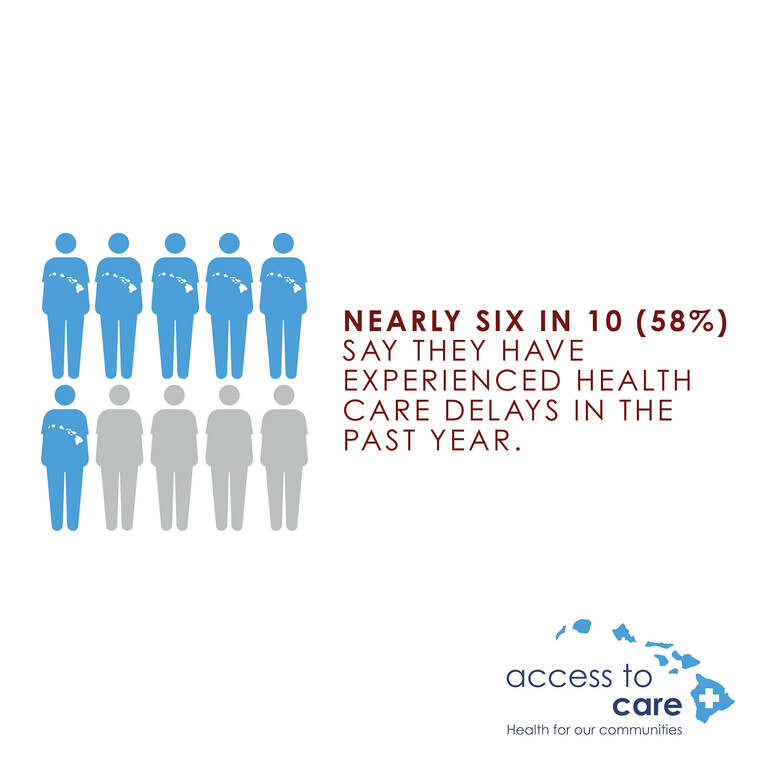LIHU‘E — A new survey shines a light on island residents’ struggle to pay for and access health care.
More than half of Kaua‘i residents (51%) cut back on medical care or medicine this past year because they were short on money, according to the Access to Care survey released this week by the nonprofit Community First.
81% of respondents statewide reported that affordability was the most important factor affecting their health, while 40% said that the pandemic had made economic instability worse for them.
“We’ve all heard the stories of pain and problems with access. It’s hard to live in Hawai‘i and not hear those stories. But now we have data to back them up,” said researcher Lisa Grove of Grove Insight Ltd., who monitored the research and provided analysis.
Some 52% of people statewide had to make cutbacks on food for financial reasons, and Grove reported that this number was higher on Kaua‘i.
CEO and President of the Kaua‘i Community Health Alliance Jim Winkler, who also practices medicine at the Hale Lea Clinic, speculated that the high cost of medicine for patients on the Medicare drug plan could be a factor in Kaua‘i residents’ struggles to pay for health care.
“The Medicare drug plan is really terrible,” said Winkler. “It was put into effect by the Bush administration and it barely covers medication. Your medicines are still very expensive, and after a certain point you exhaust your benefits and you fall into what is called the ‘donut hole.’”
The “donut hole” is described on the Medicare website as “a temporary limit on what the drug plan will cover,” which begins after a recipient has spent a certain amount on drugs. After this point Medicare beneficiaries are responsible for 25% of the cost of brand-name drugs.
Health-care affordability is a problem that has come to the forefront during the COVID-19 pandemic. A March report from Gallup and West Health through the Healthcare Affordability Index and Healthcare Value Index estimated that 112 million Americans have trouble paying for health care.
Alan Burdick, a member of the Health Committee of the Democratic Party and Chair of the Kupuna Caucus, saw the pandemic as a catalyst to spark the implementation of a universal health-care system.
“This was the time to say, ‘OK, let’s go back to the drawing board and change everything — everyone gets single-payer health care,” said Burdick.
While Hawai‘i requires employers to provide health coverage to employees working more than 20 hours a week, unemployed or part-time employees can still fall through the cracks. The 2018 uninsured rate was 4.6 in 2018, according to a report from the Kaiser Family Foundation.
Access to Care
Kaua‘i residents also reported struggles in accessing care, with 69% behind schedule with routine appointments compared to 53% statewide. Some 80% said lack of appointments was a reason they couldn’t see a doctor, compared to 62% statewide.
“It isn’t just access to specialists — things you would expect to go off-island for,” said Grove. “It was just trying to get in for primary care.”
Winkler said that these trends mostly come as a result of a lack of providers, which he attributed largely to low Medicare reimbursement rates.
“We can’t pay providers, we can’t recruit providers,” said Winkler. “If you don’t have enough oxygen coming through the tube there’s only so much you can do.”
A full 80% of Kaua‘i respondents said that they saw physician shortages on island.
One Kaua‘i respondent (names and identifying information were not disclosed due to privacy concerns) said that they often needed to find new primary-care providers since many practitioners only remain on island for a brief time.
“This causes patients to have to find a primary-care provider constantly,” they said. “I’ve had to do that three times during the past five years.”
“It’s easy to fall through the cracks here in terms of scheduling referrals with appropriate specialists,” another Kaua‘i respondent said. “Also, if certain machines break down or aren’t available, critical care can be delayed to a point where the lack of care can have disastrous results.”
This respondent reported that their roommate had been waiting for cancer surgery for two months due to delays in scheduling appointments and machines being unavailable.
“This could likely cause her cancer to spread,” they said.
“It takes too long to get an appointment with my primary-care physician,” said a third respondent. “I made my appointment in October 2021 only to find out the first available appointment was in June 2022.”
The results didn’t show corresponding negative physical- or mental-health effects on Kaua‘i, Grove said. Data from Hawai‘i Health Matters in 2019 did show that Kaua‘i had worse health outcomes than other islands, though, with a heart-attack death rate and suicide rate higher than the statewide average.





The bottom line is that people need to learn how to take better care of themselves, how to make healthier choices and not to get sick. The human body wants to stay healthy, stay balanced and in alignment. 80% of the top killers can be prevented or treated with lifestyle changes. And those practices are only mostly taught in alternative offices and not in medical offices. The model of treatment even of early detection by medicine and surgery is a faulty method.
The current generation of children is predicted to have a shorter lifespan than that of the previous generation all because of lifestyle – diet and exercise and they will be lining up in doctor’s offices sooner rather than later.
The trend towards boutique or concierge or subscription practices has put a strain at even finding a Primary Care Physician and has left people without care.
We have to have a health consciousness and not a disease treatment consciousness.
lifestyle and good choices is so important for health… but we need to stop the drug companies for charging so much for medications… my medicare paid 1,500.00 for a small vial of toenail fungal medication…. why does this medication cost so much???…. our medicare and medicaid funds are not able to keep up paying for such outrageous drug costs…. also family member cancer medication cost over 24,000.00 each month…. medicare is paying for that too.. we need to take steps to stop these big drug companies from these outrageous costs..
Yes, medications are costly. It’s startling that the predominate health profession has only two tools – medication & surgery and that medications are so freely prescribed even when they don’t know what’s wrong – not sure what you have but here take this.
I have a friend who has been on HUD for many years. He is on 18 daily medications and several weekly/monthly medications. When I helped him move there were numerous large cardboard boxes of used & unused drugs, all paid for by HUD. Big Pharma is the only entity doing one minute tv commercials because they can afford them and because they need to tell of the side (direct) effects of all medications.